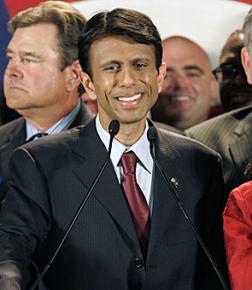Taking a stand...on the necks of the jobless
looks at the collection of clueless Republican governors who are refusing federal assistance to boost unemployment benefits.
LOUISIANA GOV. Bobby Jindal wants to take a stand against "big government." And he doesn't care how many other people have to suffer so he can do it.
Jindal along with the Republican governors of eight other states, most of them in the South, have announced that they will reject millions of dollars from President Barack Obama's stimulus legislation.
Specifically, they're turning down money designated for unemployment benefits--because they refuse to make changes to state regulations that would expand eligibility.
The way unemployment benefits are administered is up to individual states, and many go by outdated rules that leave out thousands of people who would otherwise qualify for benefits--or at least qualify for a larger check. One provision in the $787 billion stimulus bill signed into law in February offers incentives to states to update their rules.
For one thing, states would be required to use a more up-to-date time frame in determining if an unemployed worker had earned enough to qualify. Some states still use rules put in place before the widespread use of computers that exclude data from a worker's last three to five months of employment. Workers who cycle in and out the labor force--typically, low-wage workers--lose out.

According to the National Employment Law Project, some 40 percent of applicants who currently don't qualify because they didn't earn enough would be eligible if states complied with the proposed alternative base period.
The stimulus law would also require states to broaden their definition of who is eligible. Currently, some states leave out people who were employed part-time, or who were forced to stop working, for instance, to care for a sick child.
Unemployed workers would see an immediate increase in benefits--sorely needed in these crisis times--if state governments agreed to update their rules.
Sounds reasonable--but not to the governors of Alabama, Georgia, Louisiana, Mississippi, South Carolina, Texas, Alaska and Idaho. They've decided that they aren't going to let the federal government tell them what to do about their unemployment insurance system--even if that means the jobless starve.
Take care South Carolina. According to the Bureau of Labor Statistics, South Carolina's 2008 annual average unemployment rate was 6.9 percent--a 1.3-point increase from 2007. In December, the state's unemployment rate stood at 9.5 percent--the third-highest in the country.
In 2007, more than 15 percent of South Carolinians lived below the poverty line, according to the Census Bureau, which was above the national percentage. According to 2007 U.S. Department of Agriculture statistics, 14.7 percent of South Carolina households were considered "food insecure"--ranking it among the worst states, alongside other stimulus aid refusers like Texas, Louisiana and Mississippi.
With these numbers in mind, you'd think Gov. Mark Sanford would be eager to get some help for South Carolina workers.
But Sanford's priority isn't the living standards of South Carolina workers. Responding to the federal government estimates that his state could see the creation of 50,000 jobs as a result of its $8 billion in stimulus spending, Sanford compared the plan to "the Soviet grain quotas of Stalin's time--X number of jobs will be created because Washington says so."
The thought of providing benefits to part-time workers was especially distasteful to Mississippi Gov. Haley Barbour. "The unemployment insurance reform, if you will, would require the state to pay people who are not willing to take a full-time job," Barbour told Fox News.
On February 25, protesters told Barbour what they thought of his plan at a rally at the capitol in Jackson. The crowd chanted, "Take the money, Haley!"
Candace Foss and her daughter took their frustration with Georgia Gov. Sonny Perdue to the capitol building in Atlanta on February 24. Foss lost her job as a data management specialist at Home Depot in January. She's eligible for benefits--but she came anyway to deliver a letter of protest to Perdue and stand in solidarity with unemployed Georgians who were not so lucky.
"I don't think he truly understands the plight of his citizens," Foss told the New York Times. "He's surrounded by people with good jobs, who make good salaries. He's not surrounded by people like me."
Foss has the right idea. It's time that these out-of-touch politicians are surrounded by a different group of people--by the working people, mobilized in protest, whose lives hang in the balance as the economy plunges deeper into crisis.


